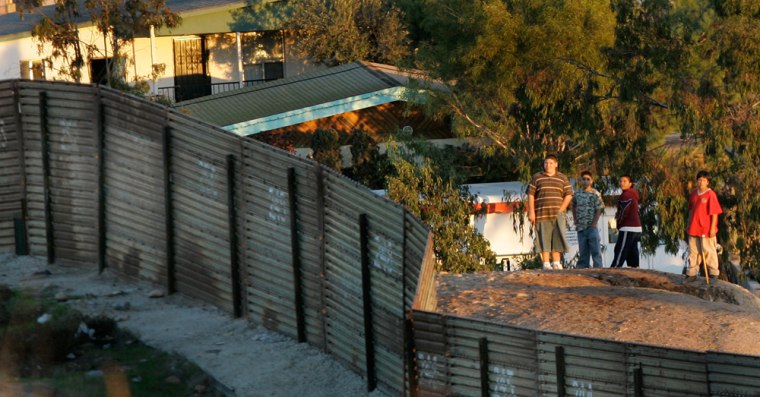The Border Patrol says its agents were attacked nearly 1,000 times during a one-year period along the Mexican border, typically by assailants hurling rocks, bottles and bricks. Now the agency is responding with tear gas and powerful, pepper-spray weapons, including firing into Mexico.
The counteroffensive has drawn complaints that innocent families are being caught in the crossfire.
"A neighbor shouted, 'Stop it! There are children living here," said Esther Arias Medina, 41, who on Wednesday fled her Tijuana, Mexico, shanty with her 3-week-old grandson after the infant began coughing from smoke that seeped through the walls.
A helmeted agent on the U.S. side said nothing as he stood with a rifle on top of a 10-foot border fence next to the three-room home that Arias shares with six others.
"We don't deserve this," Arias said. "The people who live here don't throw rocks. Those are people who come from the outside, but we're paying the price."
Witnesses in Arias' neighborhood described eight attacks since August that involved tear gas or pepper spray, some that forced residents to evacuate.
The Border Patrol's top official in San Diego, Mike Fisher, said his agents are taking action because Mexican authorities have been slow to respond. When an attack happens, he said, American authorities often wait hours for them to come, and help usually never arrives.
"We have been taking steps to ensure that our agents are safe," Fisher said.
Violence escalating
Mexico's acting consul general in San Diego, Ricardo Pineda, has insisted that U.S. authorities stop firing onto Mexican soil. He met with Border Patrol officials last month after the agency fired tear gas into Mexico. The agency defended that counterattack, saying agents were being hit with a hail of ball bearings from slingshots in Mexico.
U.S. officials say the violence indicates that smugglers are growing more desperate as stepped-up security makes it harder to sneak across the border. The assailants try to distract agents long enough to let people dash in the United States.
The head of a union representing Border Patrol employees said the violence also results from the decision to put agents right up against the border, a departure from the early 1990s when they waited farther back to make arrests.
"When you get that close to the fence, your agents are sitting ducks," said T.J. Bonner, president of the National Border Patrol Council.
Border Patrol agents were attacked 987 times along the U.S.-Mexico border during the 12-month period that ended Sept. 30, the agency said. That's up 31 percent from 752 attacks a year earlier, and it's the highest number since the agency began recording attacks in the late 1990s.
About two-thirds of the attacks were with rocks. Many of the rest involved physical assaults, such as illegal immigrants getting into fistfights with guards.
About one of every four attacks occurred in San Diego, and most of those happened along a heavily fortified, 10-mile stretch of the border starting at the Pacific Ocean.
Agent Joseph Ralph estimates he has been struck by rocks 20 times since joining the Border Patrol in 1987, once suffering a broken a shoulder blade. "You find yourself trying to take cover," he said.
About four months ago, a large rock struck the hood of agent Ellery Taylor's vehicle. "The only thing you can think is, 'I'm glad that that wasn't my head.' There's no way to see it coming," Taylor said.
Agents receive more power
In October, agents in California and Arizona received compressed-air guns that shoot pepper-spray canisters more than 200 feet. Agents already had less powerful pepper-launchers that lose their punch after about 30 feet — even less if absorbed by thick clothing or cardboard.
The Border Patrol says the pepper weapons are a less lethal alternative to regular guns, but they have caused at least one fatality. In October 2004, a college student died after she was struck in the eye by a pepper-spray canister that officers fired to control a celebration of the Red Sox's pennant win.
Border Patrol SWAT teams along the 1,952-mile U.S.-Mexico border are also equipped with tear gas, "flash bombs" that emit blinding light and "sting ball" grenades that disperse hundreds of tiny rubber pellets.
U.S. officials say the new tactics may spare lives. In March, an agent shot and killed a 20-year-old Mexican man whose arm was cocked back in Calexico, Calif., where rock attacks have soared in the last year. Two years ago, an agent fatally shot a rock thrower at the San Diego-Tijuana border.
No criminal charges were filed in either case.
Robis Guadalupe Argumedo, a seamstress in Tijuana, said she has been startled by tear gas on four nights since Aug. 7, when her 12-year-old son suffered a nose bleed. That attack also shattered a window of her neighbor's car.
Argumedo, 31, said she shouted in protest across the border at a helmeted agent on Dec. 8 after opening her front door to a cloud of tear gas. "He said: 'I'm the policeman of the world and I can do what I want.'"
Benito Arias said his 19-year-old sister-in-law fainted during an apparent tear gas attack about two weeks ago. The woman, five months pregnant, was given oxygen at the hospital.
His father, Jose Arias, fled with his wife a few blocks away, where paramedics checked their blood pressure. He said he sympathizes with the Border Patrol because Mexican authorities do nothing to prevent people from hurling rocks over the fence at agents.
"This is a matter between government and government," said Arias, 75. "They have to work out an agreement. We are innocent. What can we do about it?"
